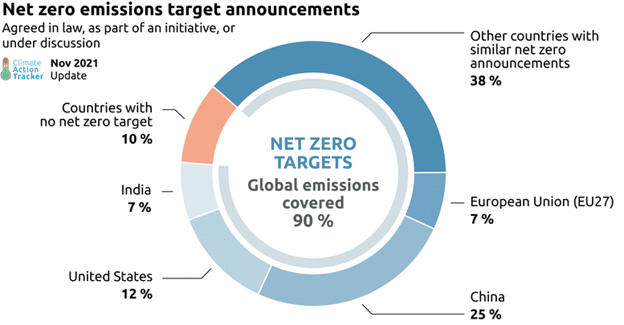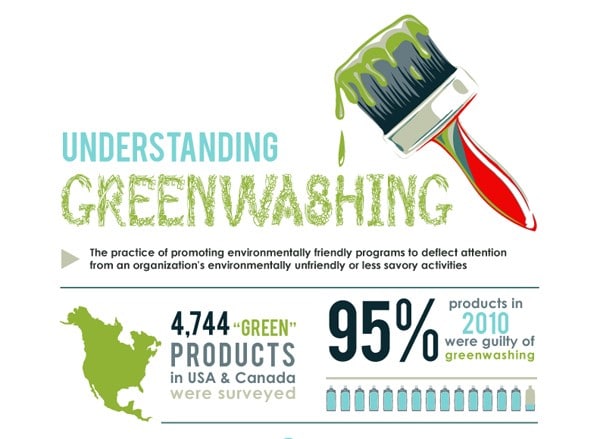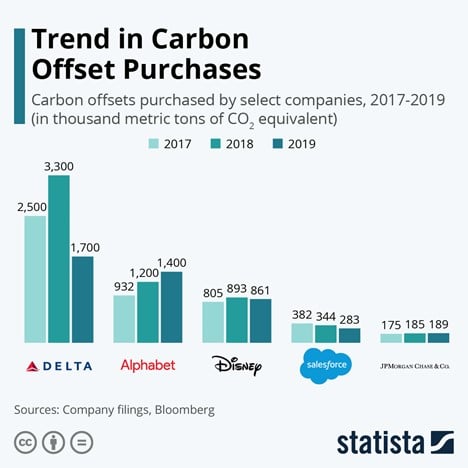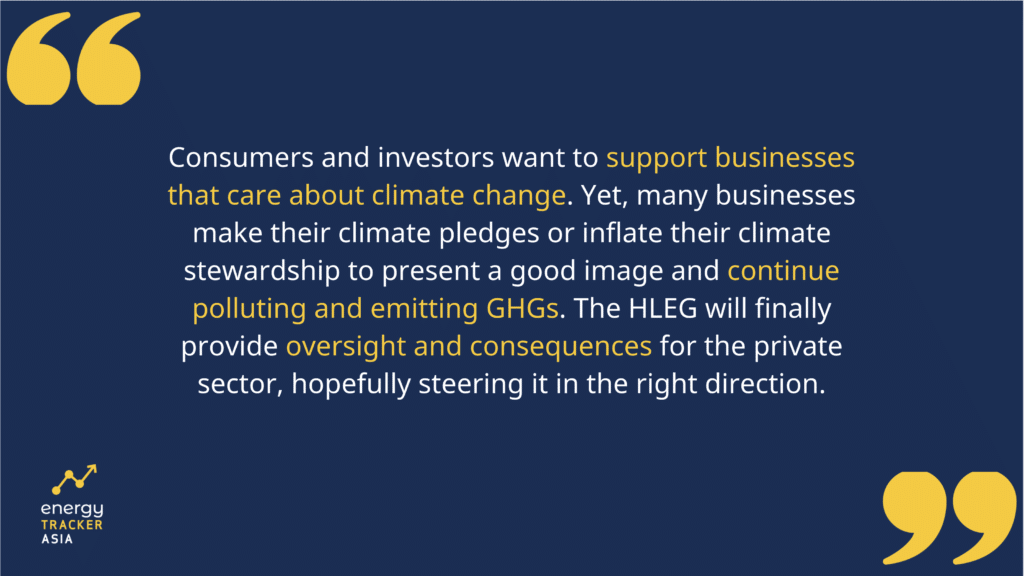HLEG: The New UN Net-Zero Group Creating Standards
blurAZ via Getty Images
20 April 2022 – by Eric Koons
The High-Level Expert Group on the Net-Zero Emissions Commitments of Non-State Entities (HLEG) is the new, primary UN net-zero group tasked with ensuring that non-state actors are sincere about their climate pledges. It was officially launched on March 31, with Canada’s Catherine McKenna leading the newly formed climate group.
McKenna previously served as Canada’s minister of environment and climate change from 2015 to 2019 before leaving Canadian politics in 2021. She has become the chair of the HLEG.
The remaining members of the group are climate experts, CEOs, economists and politicians from all corners of the globe. The group’s main objective is to bring transparency, accountability and measurable progress to the climate pledges made by businesses, investors, cities and regions.
Countries are held accountable for their net-zero pledges by the UN and other multilateral organisations and agreements. Non-state actors, however, have not had a governing body by which their climate pledges and net-zero claims are held accountable.
The HLEG will be the governing body that can adjudicate, track and penalise – if necessary – organisations and their net-zero claims. The body will provide its first report to the UN with findings and recommendations in early 2023.
Current Landscape of Net-Zero Emissions Pledges and Net-Zero Commitments
Significant reductions in emissions need to happen fast. The Paris Agreement, signed by 193 parties, binds countries to the pledge of net-zero carbon emissions by 2050 for limiting global temperature rise lower than 1.5 degrees Celsius.

Herein lies part of the problem. With the 2050 date set far off in the future, many companies have taken a “laissez-faire” approach to climate change. It is almost like they are saying, “We’ll worry about it when that time comes.” Obviously, they cannot just sit by and do nothing. But, as long as they say the right things, they can continue with business as usual.
Research shows that consumers and investors want to support businesses that care about climate change. Many businesses make their climate pledges or inflate their climate stewardship to present a good image. However, at the same time, they continue polluting and emitting GHGs in the same manner as before.
By the end of 2021, 622 of the world’s 2,000 largest public companies had announced net-zero strategies. However, the majority of these pledges fall short. A report by Capital Monitor found that only 20% of climate pledges align with science-based targets.
There is no legal mechanism in place for a company to face the consequences if they are inflating or flat out lying about their climate stewardship – also known as greenwashing. Unfortunately, almost every company is doing this. Only 5% of global companies have not been caught greenwashing.
This is why the UN’s net-zero group (HLEG) was established. The scale and urgency of climate change, coupled with the lack of action by big business – despite plenty of climate proclamations – has created the need for an oversight body.

How Will the HLEG Ensure Global Emissions are Reduced?
Specifically, the HLEG has announced four key areas of focus:
- current standards and definitions for setting net-zero targets,
- credibility criteria to assess the objectives, measurement and reporting of net-zero pledges,
- processes for verification and accounting of progress toward net-zero commitments and reported decarbonisation plans and
- a road map to translate standards and criteria into international and national-level regulations.
One of the issues with previous iterations of an overseeing body for climate targets is that there were no universal target-setting, tracking, or measuring standards. There are minor nuances and large differences between the terms net-zero emissions, net-zero carbon emissions, carbon-neutral, climate-neutral and climate positive. The difficulty in tracking and measuring the progress of different companies when they are all using different methodologies is nearly impossible.
In short, the HLEG will seek to form a universally accepted standard for climate targets. Fewer acceptable terms and more straightforward definitions will remove a lot of the confusion and, frankly, a lot of the room for greenwashing.
The UN’s Net-Zero Group Will Add Oversight to Carbon Offsets
Another issue with prior oversight, or lack thereof, has to do with carbon offsets. Businesses that are heavy polluters can buy carbon credits, plant trees, or contribute to a variety of other climate-friendly activities to “offset” the emissions they generate.
There are two major issues with carbon offsets. Firstly, there is no universal standard. While one tonne of carbon emissions might equate to a certain amount of trees planted through one offset program, one tonne of emissions might equate to a different amount of trees planted via a different program. There is no consistency.
Secondly, and most importantly, carbon offsets give businesses a free licence to pollute. Companies do not have to reduce emissions to hit net-zero if they buy enough carbon offset credits. They can even increase their emissions but still hit net-zero if they buy more credits.

Meanwhile, the idea behind carbon offsets was to give businesses in sectors like cement production, where it is next to impossible to operate without creating emissions, a chance to reach net-zero. However, some see it as a free pollution licence for the world.
The UN’s net-zero group will look to bring change to the carbon offset industry.
While the exact method remains unclear, the HLEG will have the power to punish wrongdoers or greenwashers. Previous climate oversight groups were hesitant to criticise bad actors. The HLEG will hopefully not suffer from the same intimidation effect.
Future of UN Net-Zero Group – The Time to Act is Now
The HLEG will finally provide oversight and consequences for the private sector, hopefully steering it in the right direction.
For decades, we have been talking and hearing about the importance of climate change and global warming. The time for talking is over, and the time for action is upon us. We need to make this the decade of delivery, not the decade of promise.
Countries, businesses, investors, regions, cities and individuals all need to find ways to contribute to lowering emissions. And the HLEG will help to keep the private sector in check.

by Eric Koons
Eric is a passionate environmental advocate that believes renewable energy is a key piece in meeting the world’s growing energy demands. He received an environmental science degree from the University of California and has worked to promote environmentally and socially sustainable practices since. Eric’s expertise extends across the environmental field, yet he maintains a strong focus on renewable energy. His work has been featured by leading environmental organizations, such as World Resources Institute and Hitachi ABB Power Grids.
Read more